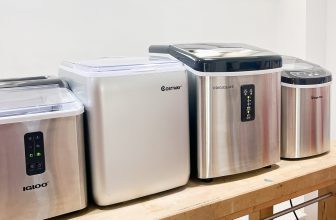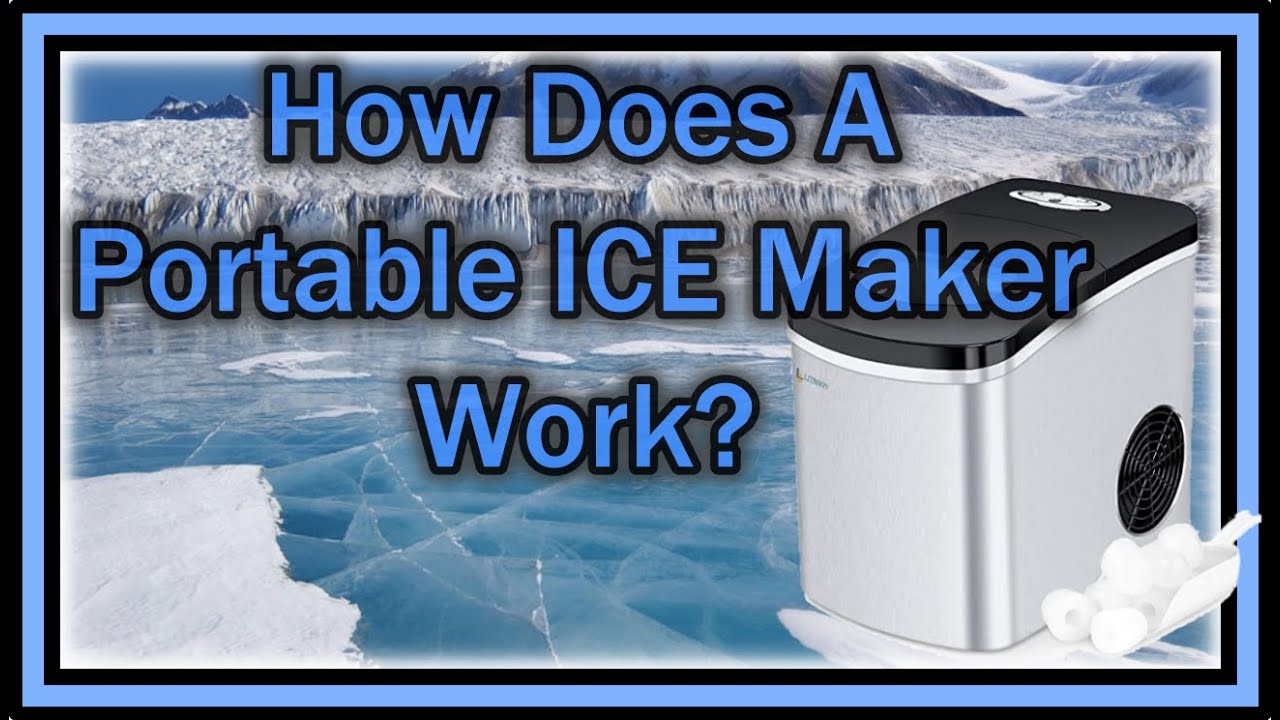As an Amazon Associate I earn from qualifying purchases.
Are Countertop Ice Makers Safe?
Are Countertop Ice Makers Safe? Is it surprising to learn that the countertop ice maker market is projected to reach a multi-billion dollar valuation by 2026? With such popularity, it’s natural to wonder about the safety of these increasingly essential kitchen gadgets. Given their convenience and efficiency, it’s crucial to ensure they don’t inadvertently become a health hazard.
Historically, concerns around the safety of countertop ice makers have centered on potential bacterial contamination. According to the CDC, improperly maintained ice machines can harbor bacteria like E. coli. However, modern designs often include advanced filtration systems and self-cleaning functions, significantly mitigating these risks and ensuring safer usage.

Understanding the Safety Concerns About Countertop Ice Makers
When it comes to using countertop ice makers, one of the biggest concerns is bacterial contamination. Without proper cleaning, germs like E. coli can grow inside the machine. This can lead to health issues if the ice is consumed. It’s important to recognize signs that your machine may need cleaning, like strange odors or visible mold. Regular maintenance is key to avoiding these risks.
An additional safety concern is the quality of water used in the ice maker. Tap water can contain various impurities that could affect the safety of the ice. Using filtered water can lessen these risks. Many modern countertop ice makers come with built-in filters to help with this issue. Still, routine checks are necessary to ensure the filter is functioning properly.
Another potential risk involves the electrical components of these machines. Faulty wiring or poor design can lead to electrical hazards. Ensure the ice maker complies with safety standards and has proper certifications. Checking for any recalls or safety notices can also provide peace of mind.
Finally, consider the materials used in the machine’s construction. Some plastics can leach chemicals into the ice, especially if they are not food-safe. It’s important to choose ice makers with BPA-free and food-grade materials. Reading user reviews and expert recommendations can help guide your decision.
The Potential for Bacterial Contamination
Bacterial contamination in countertop ice makers can pose serious health risks. Harmful bacteria, such as E. coli and Salmonella, can thrive in moist environments. If not cleaned regularly, ice makers become breeding grounds for these germs. This can lead to foodborne illnesses when the contaminated ice is consumed. It highlights the importance of proper cleaning routines.
To combat these risks, many modern ice makers include self-cleaning features. These features help minimize the chances of bacterial buildup. However, self-cleaning should not replace regular manual cleaning. Users should follow manufacturer instructions for cleaning frequency and methods. This ensures the machine remains hygienic and safe for use.
Using a simple cleaning routine can greatly reduce the risk of contamination. Consider using the following steps:
- Empty the ice maker completely and unplug the machine.
- Use a soft cloth and mild detergent to clean the interior surfaces.
- Rinse with clean water to remove any soap residue.
- Allow the machine to dry completely before plugging it back in.
To further enhance safety, opt for cleaning products specifically designed for ice makers. These products are typically non-toxic and effective at eliminating bacteria. Regular maintenance and careful attention to cleaning can keep your countertop ice maker safe. Always stay updated with the manufacturer’s guidelines and safety recommendations. This way, you ensure optimal performance and hygiene.
How Modern Designs Enhance Countertop Ice Maker Safety
Modern countertop ice makers are built with numerous safety features to ensure user protection. One of the most notable advancements is the inclusion of self-cleaning systems. These systems use a combination of heat and chemical cleaners to kill bacteria. This reduces the risk of contamination and makes maintenance easier. These features enhance convenience while promoting safety.
Many ice makers now come with BPA-free, food-grade materials. This prevents harmful chemicals from leaching into the ice. Using high-quality materials ensures that the ice produced is safe for consumption. Additionally, these materials are easy to clean and maintain. Choosing products with these safety features can give users peace of mind.
Improved filtration systems are another significant advancement. These systems remove impurities and improve the quality of the water used to make ice. The inclusion of advanced water filters minimizes the risk of contaminants. Regularly replacing these filters is essential for maintaining their effectiveness. By doing so, users can ensure they always have clean, safe ice.
Lastly, modern designs often include advanced sensors and indicators. These features alert users when maintenance is needed. For instance, they can signal when the water level is low or when it’s time to clean the machine. Such alerts help in maintaining the ice maker’s performance and safety. This makes it much easier to keep the appliance in optimal condition.
The Importance of Regular Cleaning and Maintenance
Regular cleaning and maintenance of countertop ice makers are vital to ensure their safe and efficient operation. Neglecting these tasks can lead to bacterial buildup and contamination. This can result in health issues for anyone consuming the ice. Moreover, dirt and grime can affect the machine’s performance. Regular upkeep helps in extending the lifespan of the ice maker.
One of the key benefits of routine cleaning is preventing bacterial growth. Harmful bacteria, such as E. coli and Salmonella, thrive in moist environments. By consistently cleaning the ice maker, these bacteria are less likely to proliferate. The cleaner the machine, the safer the ice it produces. Here are some essential cleaning steps to follow:
- Unplug the ice maker and empty any remaining ice.
- Wipe down the interior with a soft cloth and mild detergent.
- Rinse with clean water to remove detergent residue.
- Dry all components completely before reassembling.
In addition to cleaning, regular maintenance is equally important. This might include checking the water filter and replacing it as needed. Ensuring that all moving parts are well-lubricated can prevent mechanical issues. Users should also inspect the machine for any signs of wear and tear. Addressing these issues early can prevent costly repairs down the road.
Modern ice makers often come with alerts and indicators to assist with maintenance. These features can notify you when it’s time to clean or when the water level is low. This makes it easier to keep the machine in optimal condition. Relying on these built-in tools can help ensure the ice maker remains safe and efficient.
Lastly, always follow the manufacturer’s guidelines for cleaning and maintenance. These guidelines are tailored to the specific design and components of your ice maker. By adhering to them, you can keep your ice maker running smoothly. Proper care and attention are essential for safety and longevity.
Using Filtered Water for Extra Safety
Using filtered water in your countertop ice maker can significantly enhance safety. Tap water often contains various impurities that may affect the quality of the ice. These can include chlorine, heavy metals, and other contaminants. By filtering the water, you reduce the risk of these impurities ending up in your ice. This makes the ice healthier and more enjoyable to consume.
Many modern ice makers have built-in water filtration systems. These systems are effective at removing common contaminants. However, it’s important to regularly replace the filters to ensure they remain effective. Keeping track of the manufacturer’s recommended replacement schedule is crucial. This ensures the filtration system continues to provide clean, safe water.
Investing in a high-quality external water filter can also be a good idea. These filters often provide higher levels of purification than built-in systems. Some people prefer using a filtered water pitcher or an under-sink filtration unit. This can add an additional layer of safety and peace of mind. Here are some benefits of using filtered water:
- Increased ice clarity and better taste
- Reduced risk of harmful contaminants
- Extended lifespan of your ice maker
- Improved overall health and safety
Another benefit of using filtered water is that it can extend the life of your ice maker. Hard water deposits can build up inside the machine over time. These deposits can reduce the efficiency of the ice maker and cause damage. Using filtered water helps to prevent these issues. Regular maintenance coupled with filtered water use ensures optimal performance.
For those who prefer a simple approach, water filter pitchers work well. They’re easy to use and can be refilled as needed. Additionally, using pre-filtered bottled water is another convenient option. This method provides an immediate solution for ensuring water purity. By choosing to use filtered water, you make a smart decision for both safety and convenience.
Frequently Asked Questions
Countertop ice makers are convenient appliances, but many people have questions about their safety and functionality. Below are some common queries with detailed answers to help you understand these devices better.
1. How often should I clean my countertop ice maker?
You should clean your countertop ice maker every two to three months for optimal performance and safety. Regular cleaning prevents bacterial buildup, which can contaminate the ice and affect your health. Additionally, keep an eye out for any strange odors or visible mold, as these are signs that cleaning is needed sooner.
Always refer to the manufacturer’s guidelines for specific cleaning instructions. Using a soft cloth, mild detergent, and filtered water can make the process easier and more effective. Proper maintenance extends the life of your appliance and ensures you always have clean ice ready to use.
2. Do countertop ice makers require a water line?
No, most countertop ice makers do not require a water line; they typically have a built-in reservoir where you can manually add water. This makes them easy to set up in various locations without needing plumbing work. It’s important to use filtered water in the reservoir to ensure the purity of the ice produced.
Portable design is one reason these appliances are popular for home use, RVs, and outdoor events. Moving them from place to place is straightforward since they only need electricity and added water to function efficiently.
3. What types of filtration systems do modern countertop ice makers use?
Modern countertop ice makers often come equipped with advanced filtration systems that remove common contaminants like chlorine and heavy metals from tap water. These filters significantly enhance the quality and safety of the produced ice by ensuring it is free from harmful substances.
The filters usually need periodic replacement, so follow the manufacturer’s recommendations on frequency. Keeping filters updated guarantees that your ice remains clear and tastes pure, adding an extra layer of safety for users.
4. Can using my countertop ice maker save money compared to buying bagged ice?
Yes, using a countertop ice maker can be more cost-effective over time compared to continually purchasing bagged ice from stores. While there is an initial cost for purchasing the machine, continuously producing your own ice reduces recurring expenses significantly.
This appliance also delivers fresh and cleaner-tasting ice right at home without additional trips to purchase supplies. The convenience alone can be worth the investment for many households or businesses that frequently need large amounts of quality ice.
5. Are there specific brands known for safer countertop ice makers?
Certain brands are renowned for producing high-quality, safe countertop ice makers with features such as BPA-free parts and reliable self-cleaning functions. Brands like Igloo, NewAir, and GE Profile often receive positive reviews regarding their safety standards and efficiency in producing clear, clean-tasting ice.
Reading customer reviews and expert recommendations can guide you in selecting a trustworthy brand that prioritizes user safety. Always consider models with advanced features designed specifically to enhance cleanliness and durability when making your choice.
Conclusion
Countertop ice makers are valuable additions to any kitchen, provided they are used and maintained correctly. With features like self-cleaning systems and advanced filtration, modern designs have significantly improved safety and convenience. Regular maintenance ensures you get the best performance and the cleanest ice possible.
Using filtered water and opting for high-quality brands can further enhance the safety of your ice maker. Understanding and addressing potential risks can make your experience more enjoyable. By following these guidelines, you can confidently use your countertop ice maker for fresh, clean ice whenever you need it.

Maksuda Khanam is a passionate home appliance expert and the primary author behind KitchenMarts.com






